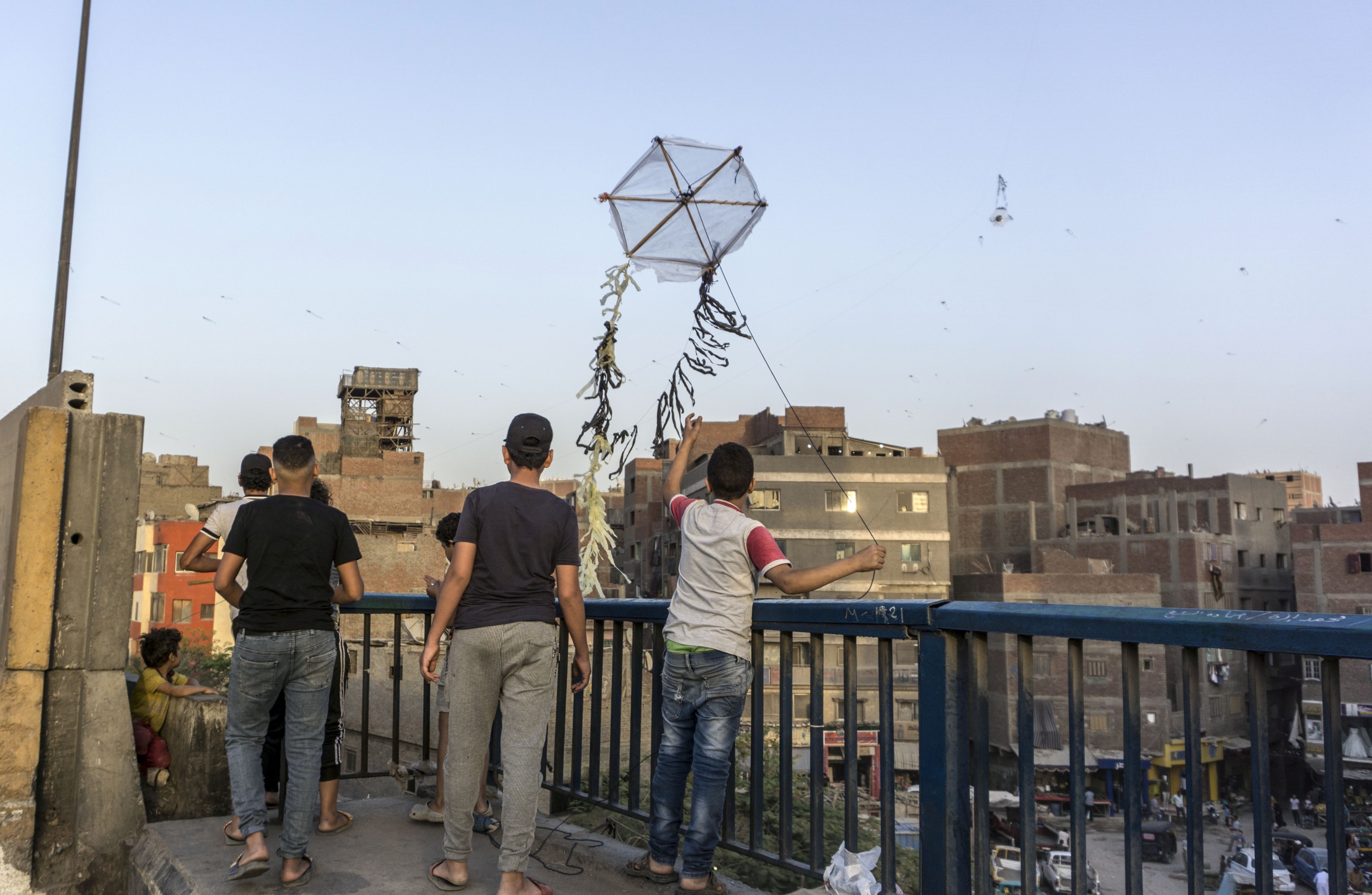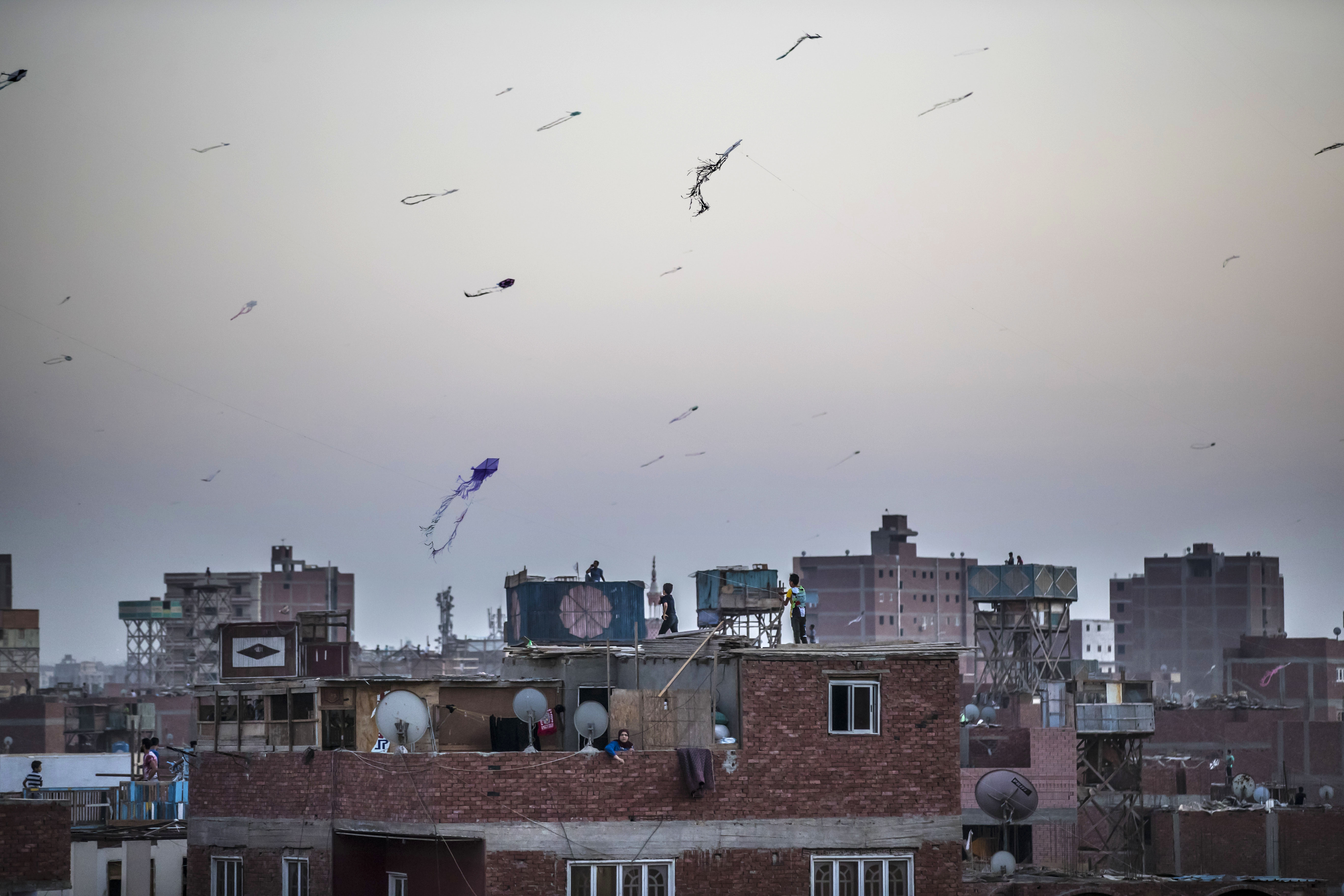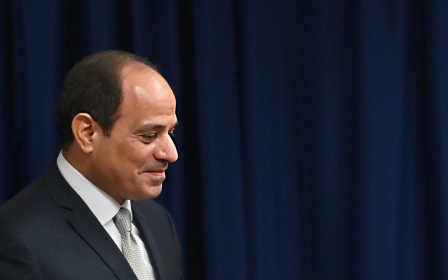Coronavirus: Kite-flying boom in Egypt leads to government crackdown

Atef is a conscript on a 15-day vacation from his military service in the western desert.
Living in the working-class district of Imbaba, west of Cairo, he grew up spending most of his time in the street, doing many outdoor activities, including flying kites.
He helps his 16-year-old brother to fly his kite from the roof of a building, giving him directions on how to wrap the string and to control it.
“I have been flying kites since I was six. It is the only outdoor activity that is free and easy to do,” Atef told Middle East Eye.
In the three months since the start of the coronavirus pandemic and the government’s enforcing of a curfew to tackle it, the popularity of kite-flying has soared.
New MEE newsletter: Jerusalem Dispatch
Sign up to get the latest insights and analysis on Israel-Palestine, alongside Turkey Unpacked and other MEE newsletters
In working-class neighbourhoods, where playgrounds, green spaces and sports areas are almost non-existent or expensive to access, many started flying colourful kites to pass the time during the boredom of curfew.
It is a safe, cheap and fun activity that anyone can do
- Mohamed Youssef, kite-flyer
The phenomenon has soaked Egypt’s skies in colour, with hundreds of people taking the activity beyond the poorer areas of the country to outdoor areas such as the walkways over the banks of the Nile in downtown Cairo, or on the bridges connecting Cairo and Giza.
The activity only requires pieces of wood, plastic, or thin bamboo, a long length of string, plus decoration of your choice.
“It is a safe, cheap and fun activity that anyone can do,” said Mohamed Youssef, a school student who has four kites and flies them with his friends and family members.
Youssef’s family has been living in Imbaba for 50 years and cannot afford membership of any of Cairo’s social or sports clubs, which can cost up to 200,000 Egyptian pounds ($12,537) for a family.
Youssef’s father, Ahmed, told MEE that “streets have been always the playground for kids. I cannot take my family of five to a summer vacation nor can I subscribe to a social club to take them there.”
Kite-flying crackdown
Despite the apparent innocuousness of the hobby, the Egyptian state has cracked down on kite-flyers, arresting hundreds across Alexandria, Cairo, Suez, Helwan and Menofia.
The arrest reports framed the detainees as young, careless and irresponsible children. Most of the young men who were arrested were released shortly afterwards, while others spent a night or two in detention.
Last week Mohamed al-Sharif, the governor of Alexandria, issued a directive banning the flying of all types of kites on beaches, claiming they had been responsible for a number of accidents.
Anyone over 18 found flying a kite risks a fine of between $19 and $63.
At least one member of parliament has called for a total ban on kite-flying across Egypt, while in June Khaled Abu Talib, a member of the parliament’s defence and national security committee, suggested that kites could be used to “threaten the national security” if they were fitted with surveillance cameras.
No alternatives
Despite the backlash from the government and other officials, kite-flying enthusiasts argue they have few options in the heavily restricted environment they currently find themselves in.
“I spend most of my time in the street because we are seven living in the same house. If we stay all together, our parents will go crazy,” said Saeed, a technical school preparatory student.
“It is frustrating that there is nowhere young people can go - not everyone can afford to go to cafes or to travel to the north coast. We spent the three months of summer trapped with nothing to do.”
Middle East Eye delivers independent and unrivalled coverage and analysis of the Middle East, North Africa and beyond. To learn more about republishing this content and the associated fees, please fill out this form. More about MEE can be found here.





